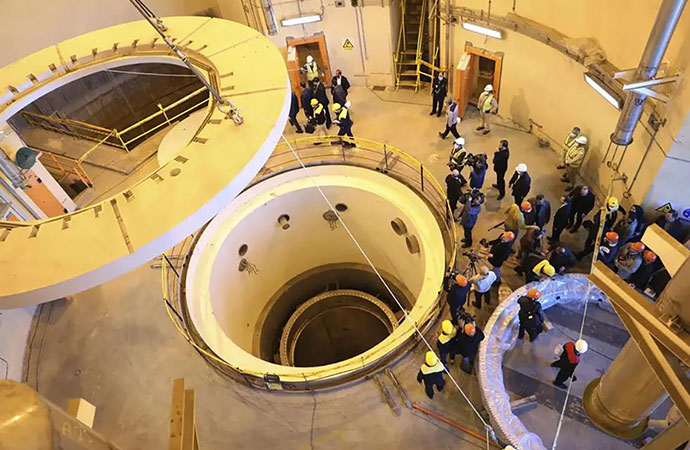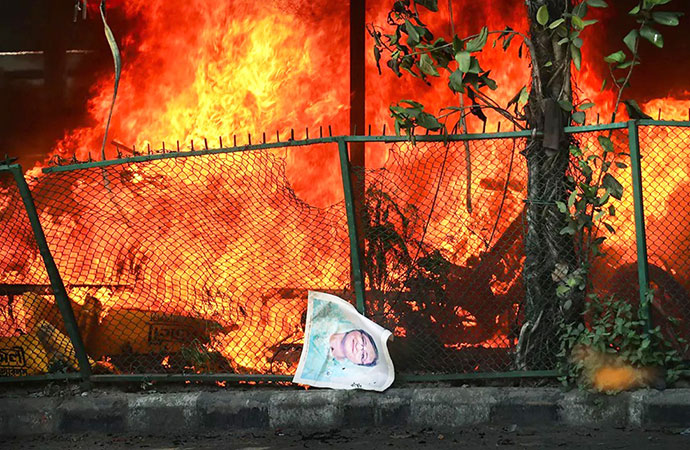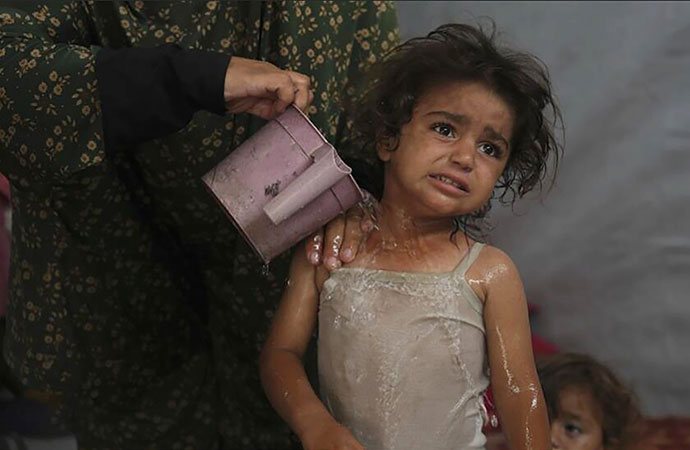Column

In this photo released by the Atomic Energy Organization of Iran, technicians work at the Arak heavy water reactor’s secondary circuit, as officials and media visit the site, near Arak, 150 miles (250 kilometers) southwest of the capital Tehran, Iran, Dec. 23, 2019. Iranian officials now speak openly about something long denied by Tehran as it enriches uranium at its closest-ever levels to weapons-grade material: Iran is ready to build an atomic weapon at will. This could be put to the test Thursday, Aug. 4, 2022, as Iran, the U.S. and the European Union prepare for a snap summit that appears to be a last-ditch effort in Vienna to revive Tehran’s tattered nuclear deal. (Atomic Energy Organization of Iran via AP/UNB
The Islamic Republic stands at a nuclear threshold. The prospect of Iran withdrawing from the nuclear nonproliferation treaty (NPT) as a response to the 12-day war may lead to the long-feared 'Persian bomb'. The NPT allows a member state to withdraw in the face of 'extraordinary circumstances'. Iran can evoke Israel's war of choice against the Islamic Republic as a situation which qualifies for an extraordinary withdrawal from the NPT.
In 2023, an Iranian nuclear administrator said "what does a car need? It needs a chassis, an engine, a steering wheel and a gearbox. You're asking if we have made the gearbox, I say yes. Have we made the engine? Yes, but each one serves its own purpose". Iran's Atomic Energy Organization has warned that the sprawling Iranian nuclear research program over the years has resulted in vast technical expertise. However, an edict from Iran's theocratic Supreme Leader purports to declare nuclear weapons as impermissible in Islam. Iranian officials have considered the possibility of overturning the fatwa against nuclear weapons.
In the wake of Israel's air strikes across Iran, the Iranian parliament suspended cooperation with the International Atomic Energy Agency (IAEA). Withdrawal from the NPT is a three-month process which begins with a formal notification by the state of its intent to withdraw. In 1993, North Korea declared its intent to withdraw from the NPT and issued a formal notification. But within the three-month timeframe, North Korea backtracked and withdrew its notification a day before the withdrawal from the NPT would have come into effect. The North Koreans received energy aid in exchange for freezing their nuclear program in the early 1990s.
North Korea eventually became the first country to withdraw from the NPT in 2003. The Joint Comprehensive Plan of Action signed between Iran and the great powers in 2016 was intended to safeguard the nonproliferation regime by delaying and freezing Iran's nuclear ambitions. According to the Bulletin of Atomic Scientists, "the NPT-based nonproliferation regime has often worked best by slowing developments and giving countries time and incentives to reconsider fateful decisions". Donald Trump's withdrawal from the JCPOA in 2018 set Iran and Israel on a collision course which crystallized in the recent 12-day war.
Nearly 60 years ago, Israel faced a similar predicament amid the outbreak of the 6-day war. Israeli scientists developed a crude nuclear device which was handed to soldiers. But Israel's sweeping victory in the war meant there was no need to publicize the Jewish bomb. In 1979, the year when Iran saw the Islamic Revolution and the overthrow of the Shah, Israel is widely believed to have conducted a nuclear detonation in the southern Indian Ocean. According to the diary of erstwhile U.S. President Jimmy Carter, "We have a growing belief among our scientists that the Israelis did indeed conduct a nuclear test explosion in the ocean near the southern end of Africa". The detonation was assisted by the apartheid regime of South Africa.
Israel adopted a policy of ambiguity on nuclear weapons. Israeli Prime Minister Golda Meir and U.S. President Richard Nixon secretly agreed in 1969 to allow the development of an Israeli nuclear arsenal. Israel was never penalized for its nuclear weapons program.
The double standard and hypocrisy of the nonproliferation regime is evident in Israel's exceptional status as the only nuclear weapons state in the Middle East which has aggressively punished the nuclear ambitions of other states in the region, including Iraq, Syria and Iran. Under the Shah, Iran signed the NPT in 1968 and became one of the founding members of the nonproliferation regime which entered into force in 1970. Iran increased its nuclear weapons research after the eight-year long Iran-Iraq War. Iran also acquired nuclear secrets from the Pakistani nuclear physicist A. Q. Khan who traded centrifuge designs on the black market.
Iran's potential withdrawal from the NPT and acquisition of nuclear weapons poses a significant challenge for the existing nonproliferation regime. Saudi Arabia has made it clear that an Iranian bomb will trigger its own nuclear ambitions. South Korea is witnessing a serious public debate on leaving the NPT and developing an arsenal in response to North Korea. Japan and Turkey may also feel incentivized to pursue advanced nuclear goals if proliferation spreads.
Defections from the NPT may be premised on the lack of progress on nuclear disarmament or the failure to universalize the treaty, which is reflected in the double standard applied to Israel. Countries like Bangladesh and Egypt have been leading voices in the nonproliferation regime, particularly in the diplomatic and political process of the NPT.
Umran Chowdhury is Assistant Editor of the Dhaka Courier and a Research Associate at the Cosmos Foundation and Bay of Bengal Institute.

























Leave a Comment
Recent Posts
Auspicious beginnings, but a l ...
The newly elected government of Bangladesh is now in office, and the e ...
Caught between tigers and pira ...
Over 10,000 fishermen in the Sundarbans have suspended their fishing a ...
Historic Chawk Bazar comes alive with iftar items on ..
Shaping Young Conservationists: School Conservation ..
Iran has said it has reached an understanding with t ..
New Finance Minister Amir Khosru Mahmud Chowdhury